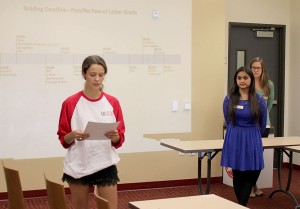USG proposes extending drop deadline
At Tuesday’s Undergraduate Student Government meeting, USG’s University Affairs Committee proposed a resolution to extend the deadline for USC students dropping a course or changing their grade option to pass/no pass. Director of Academic Affairs Nicole Schrad, Assistant Director of Academic Affairs Maariyah Patel and Greek Senator Providence Illisevich presented the resolution to the USG Senate.

Read and report · Greek Senator Providence Illisevich presents a resolution arguing for a later course drop date at USC. – Kevin Fohrer | Daily Trojan
Current USC policy gives students three weeks after the start of classes to drop a class or change from pass no pass without getting a mark of “W” on their transcript.
The proposed resolution would extend this deadline by several weeks.
University Affairs began research for the resolution in early September. They based their research on U.S. News & World Report’s college rankings. These rankings showed that the national average final date to drop a course is over 46 percent of the way into the semester, whereas USC’s date is 20 percent of the way into the semester.
“These numbers came from quantitative analysis,” Patel said. “Percentages were used to account for the difference between semester and quarter system.”
The resolution argues that students are unable to evaluate how successful they will be given the short amount of time they have to drop courses or change the grade evaluation.
“Students may be reluctant to pursue other courses of study,” the resolution said.
Proponents are also concerned that the current policy negatively impacts USC students’ transcripts, making them less competitive.
“This policy directly impacts USC students’ transcripts and places students at a competitive disadvantage upon entering the professional world and applying to graduate school,” the resolution said.
“The last week to add classes will still be the third week,” Patel said.
Students who drop after the deadline will be unable to get their tuition money back. The presenters believe, however, that the benefits outweigh the potential risks.
“This is so that students have the most competitive transcripts,” Schrad said.
Schrad said she was inspired to create the resolution after her friend, a student at Stanford, told her about the advantages of an extended deadline.
“He was really happy that [Stanford] gave him so much time to change his grade option,” Schrad said.
Schrad and Patel were unsure of why USC’s deadline policy is different than that of other universities.
“I think it was one of these policies that was established early on, with not too much thought given to it,” Patel said. “When we presented it to [Vice Provost of Undergraduate Programs] Gene Bickers, he was surprised, as if no one had ever brought it up before.”
Bickers was an early proponent of the resolution. He gave University Affairs his approval for research in early September and encouraged the committee to pursue work on project.
“He was really excited about it,” Schrad said.
If approved, the resolution will be forwarded to other university officials, included President C.L. Max Nikias.
USG will vote on approving the resolution next Tuesday.

